Avoiding Scams and Fees Selling a Cheap Car on Facebook or Craigslist
Getting the Best Possible offer without losing my mind selling online.
By Rob Cockerham |
This summer I tried to sell a used car on Craigslist and Facebook marketplace. Both platforms offered different challenges. I am most familiar with selling cars on Craigslist so that was my first choice. The car I was selling was my 2007 Hyundai Elantra. It was 17 years old and had 240,000 miles on it.
Because of the car's age and its high mileage, I set the price of the car at $2,500. A car being sold in this price range is among the least expensive cars on sale. A car posted around this price will invariably have major mechanical or cosmetic problems.
Craigslist
On Craigslist a car for sale posting will get a lot of attention in the first 24 hours. In this time I was contacted by four real people and five people who were running a scam.
There is a special scam that is unique to the used car field and that scam is the promotion of phony bullshit Vehicle Identification Number (VIN) checking services.
The way the VIN checking scams work is that someone masquerading as a potential buyer would express concern about the car's mechanical or title history and they would insist on a "VIN report" from a service that they trust. For example a scammer might ask for a "DBC" or "Database Check" printout or a "VIS report" (vehicle information services) or for a "CADB" (California Auto Database) or an "AMHR" or automotive mechanical history report. These are just made up examples, but they usually use a three-letter acronym and pretend that everyone knows about these reports.
The bullshit services that I was pushed towards are "ACP Inspection Papers" from Autocheckuppro, "AHI report" from Auto Hub Info.com and "GVH papers" from Govinhistory.com. The scammers were always interested in getting my name, probably so that they could claim a kickback or commission from the VIN report website.
(FYI, the VIN reports aren't expensive. They are around $35, probably on recurring billing, but it is a complete waste of money. None of the people asking are really going to come to buy your car.)
There is exactly one well known vehicle history report, and that is CARFAX. In many states, including California, you can access VIN history for free from the California State DMV. You don't need to buy a damn thing.
These scams were a bit heartbreaking because they were instigated by people who held conversations exactly like a real buyer would, setting up meeting times and asking about issues with the car. Eventually, I learned to sort out this scam by ignoring any inquiries that came outside my own telephone's area code.
One more scam showed up while I was selling the car on craigslist and that was a classic bad check scam. In this scam the potential buyer sends an actual check to you, for more than the car sale price. The scammer will ask you to cash it and to use the extra money for a car shipping agent or something else. To make it even easier for you, these buyers never even have to inspect the car in person! This all seems like an easy sale until the check gets returned four days later and you've given your own cash to a fake "shipping agent".
Although I had a smattering of interest, I only set up one meeting with a buyer, and unfortunately they did not show up.


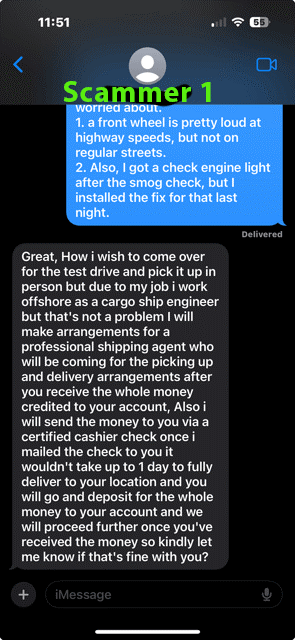
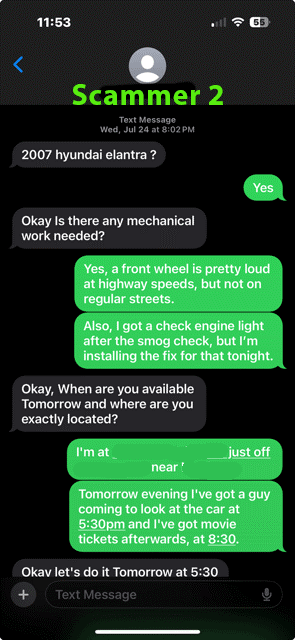
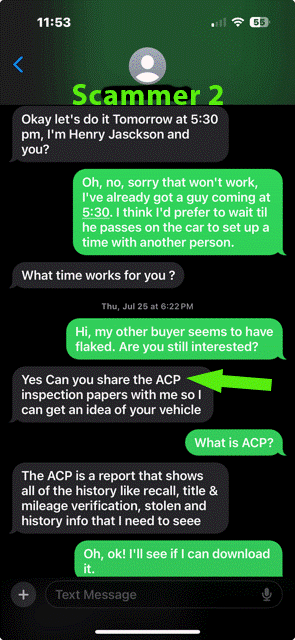
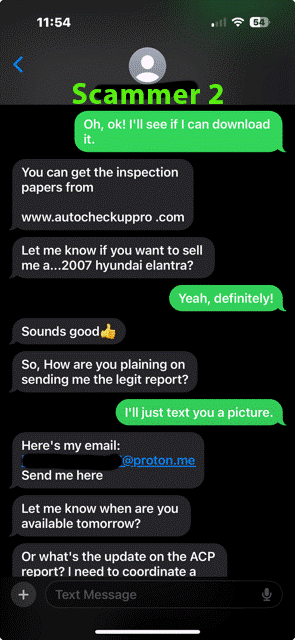
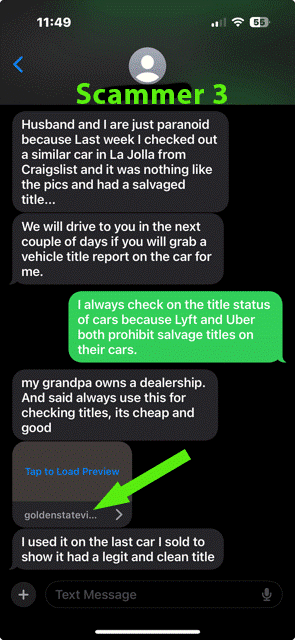
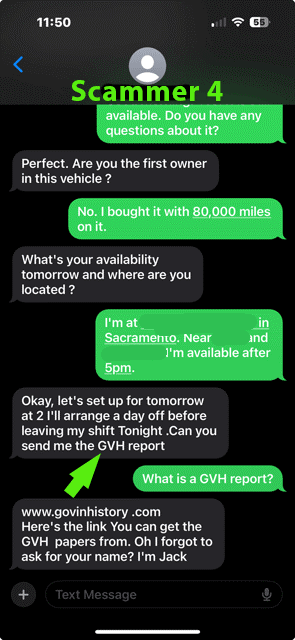
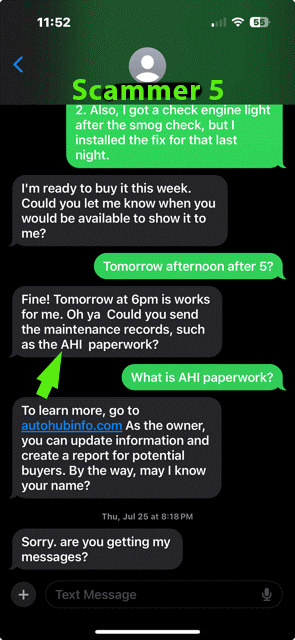
Facebook Marketplace
The next step was to put my car on Facebook Marketplace. This posting was free.
Marketplace is set up in a way that makes it very easy to inquire about an item that's for sale instead of texting or emailing. You can just click one button to send a message that asks "is this item still available? As a consequence of this arrangement a low priced car such as mine gathered dozens and dozens of responses. Every time I opened Facebook I would have three or four new messages.
About half of the new messages would be simply asking if I "still have the item available" and the other half would be terse offers on the car, stating simply "2000?" Or "1800?". See screenshots on this page.
I was surprised at how aggressively meager some of the offers were.
Because the car was only $2500, dropping 20% or 30% of the price wasn't something I wanted to do. I have always heard that it's disadvantageous for a seller to negotiate the price before a buyer has come to look at the car. This scenario was explained to me like this: If somebody negotiates the price before they come to see the car, they've really just set their new ceiling on the price and then once they actually see the car they'll try negotiating again to get the price even lower, basically creating a double-negotiation scenario.
The consequence of refusing to negotiating over messenger was that I was getting a lot of unwanted messages, and with piles of new messages coming in it could be hard to keep track of which parties were worth scheduling for a meeting.
The fact was, I was selling one of the cheapest cars available. It didn't have major problems with the engine or with the body and so I was getting a lot of attention from a group of people with a budget where every dollar counted.
After about a hundred messages, I started to take a lot less care with my responses, sometimes giving rude responses. In retrospect, I was getting frustrated because I was new and didn't understand how this game was played.
Eventually I set up two people look at the car at 5pm and at 6pm at my house.
The first person flaked.
The second group was four people, a husband and wife and their infant child, plus another guy who served as the English/Spanish language translator. I wasn't going to hide any car problems from a young family, so I told them about the questionable seat belt, the broken sun visor and the mysterious squeaking wheel. We went for a short test drive and they seemed happy enough with the car. They gave me the impression that they might resell it.
Likely as a negotiating tactic, they only brought $1800 cash with them.
However I was able to scroll through 100 facebook messages and reassure them that I would be able to get $2300 from someone. We settled at $2100... but again, the buyer didn't have that much cash, so we considered Zelle (I didn't have it) and Venmo (he didn't have it) and eventually we sent the translator to the Wells Fargo ATM to withdraw another $300 cash.
Holy Moley it is a relief to sell a car. For months I had been scheduling weekend projects, trying to fix little defects and to keep it in the best shape possible. But finally it was gone! I took it off of my insurance and immediately purchased $2100 in rare, collectable Funko Pop figurines.
See you on ebay!
.png)
.png)
.png)
.png)
.png)
.png)
.png)
.png)
.png)
.png)
.png)
.png)
.png)
.png)
.png)
.png)
.png)
.png)
.png)
.png)
.png)
.png)
.png)
.png)
.png)
.png)
.png)
.png)
.png)
.png)
.png)
.png)
.png)
.png)
.png)
.png)
.png)
.png)
.png)
.png)
.png)
.png)
.png)
.png)
.png)
.png)
.png)
.png)
